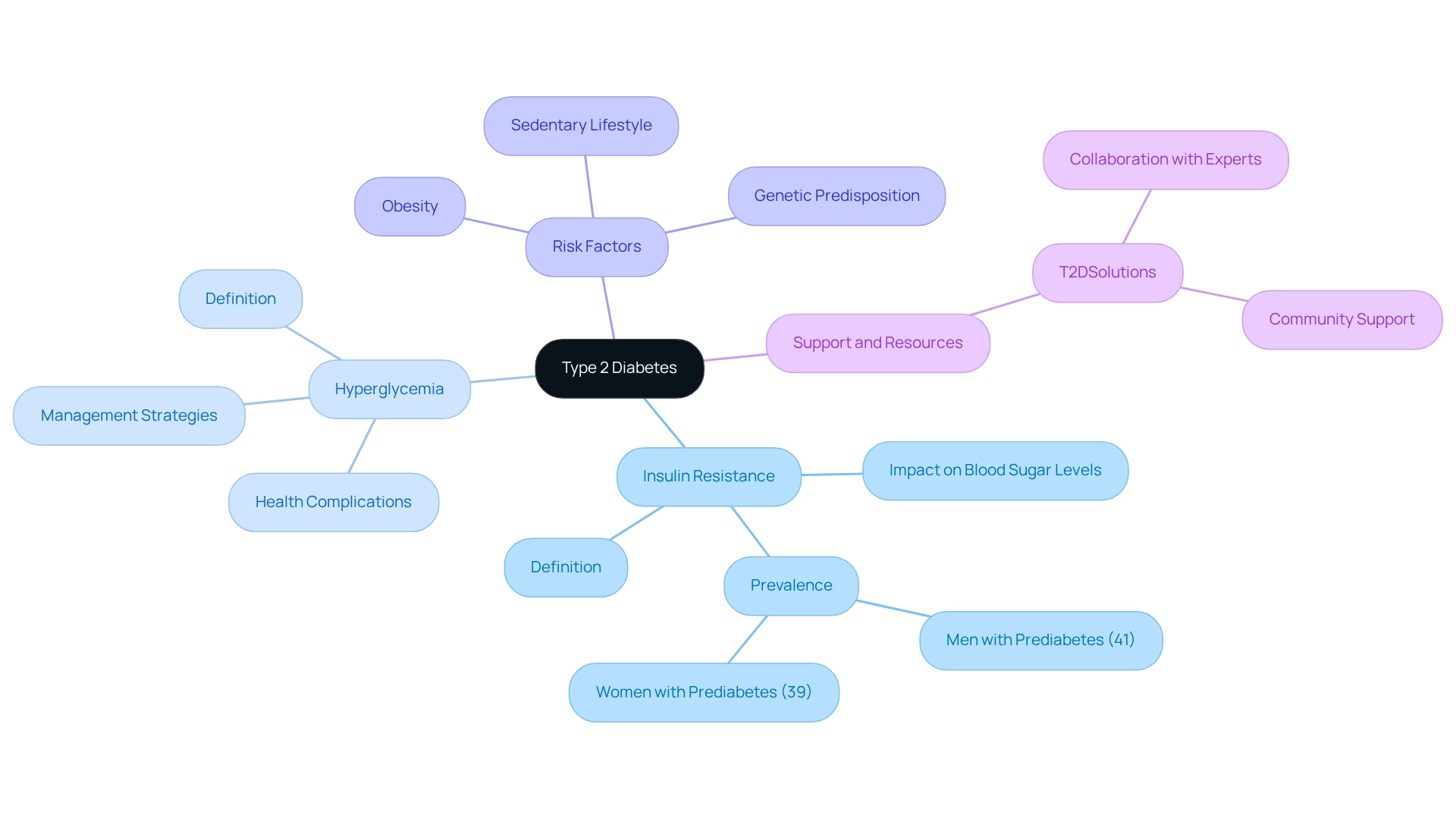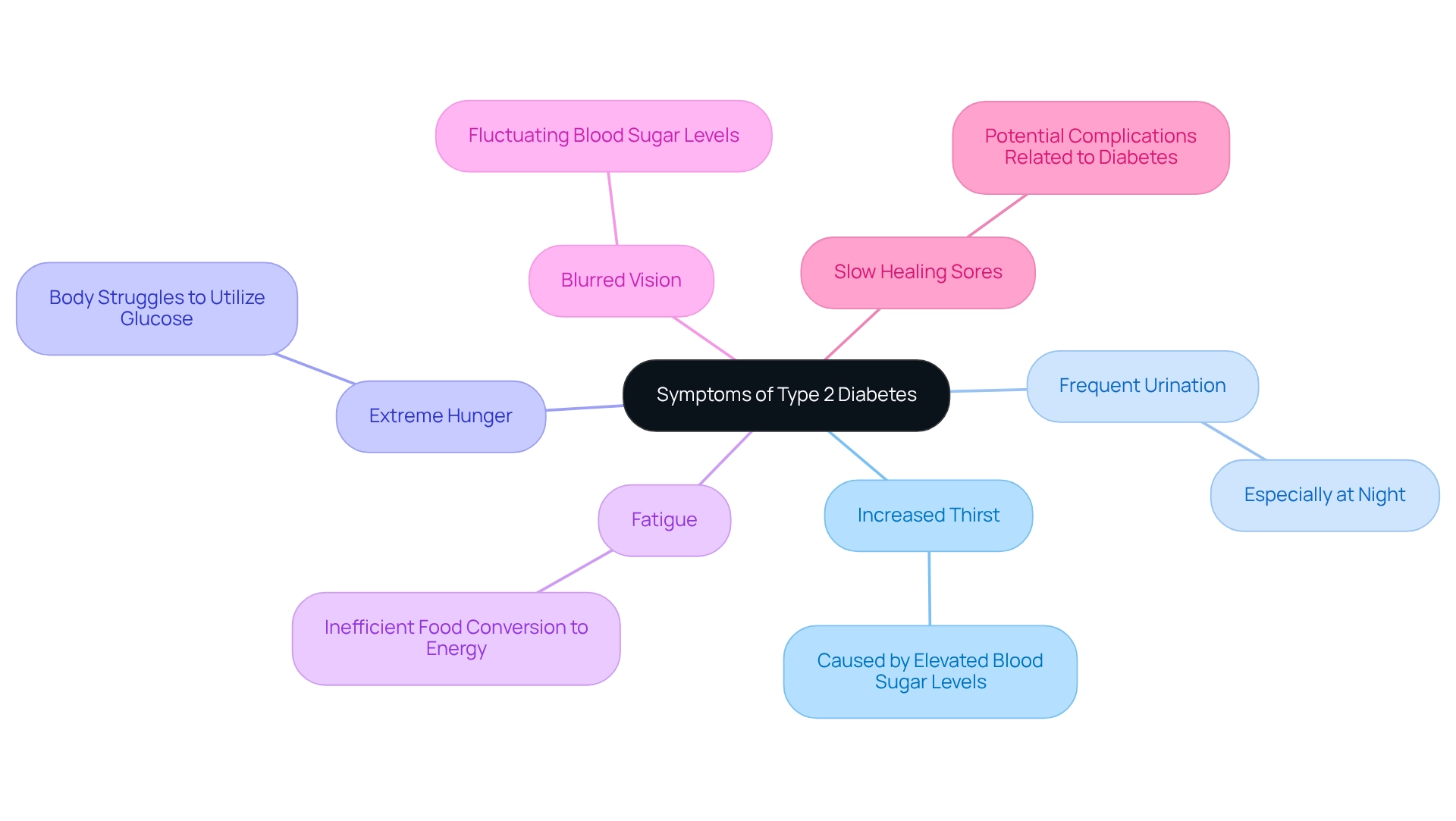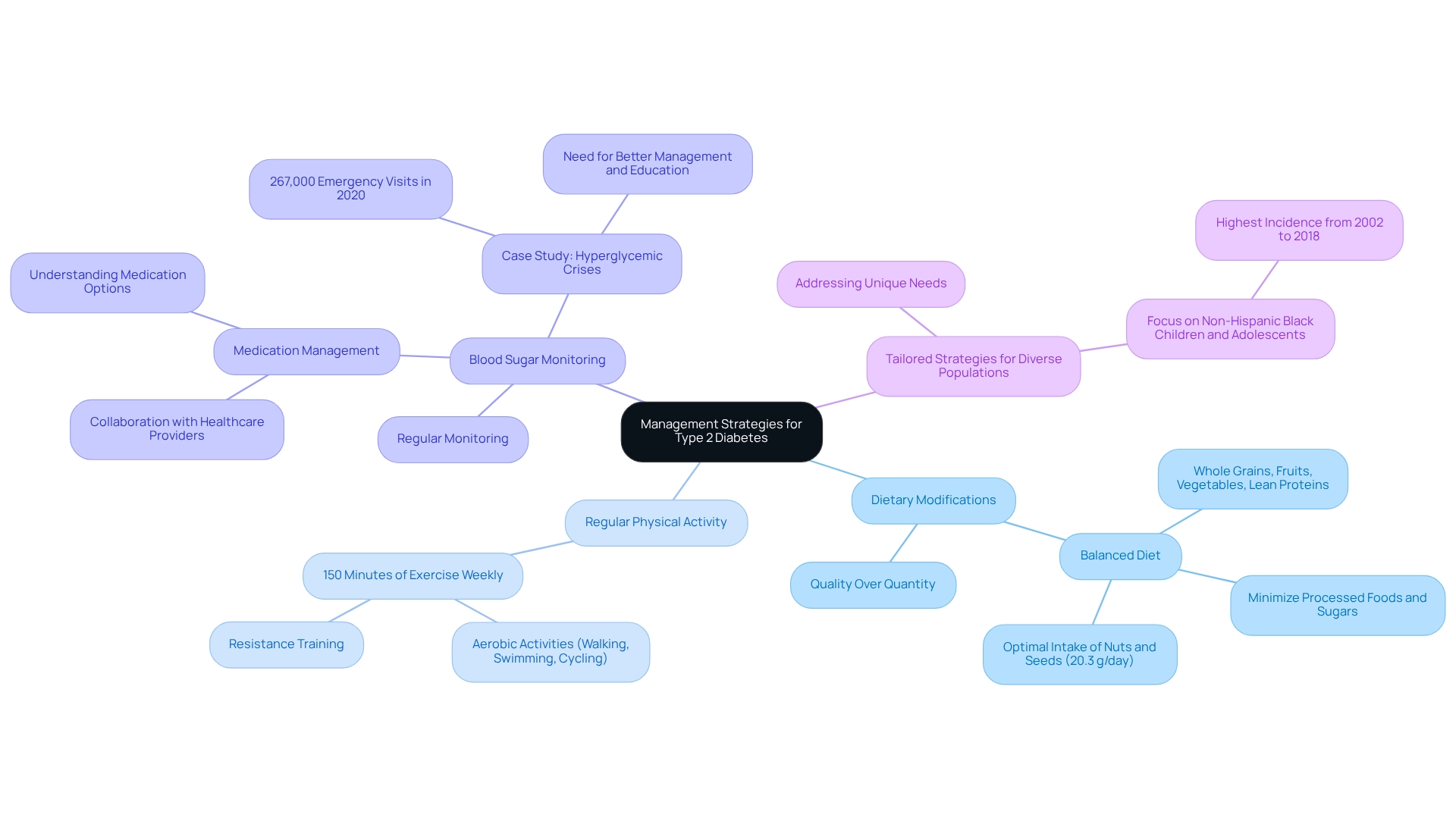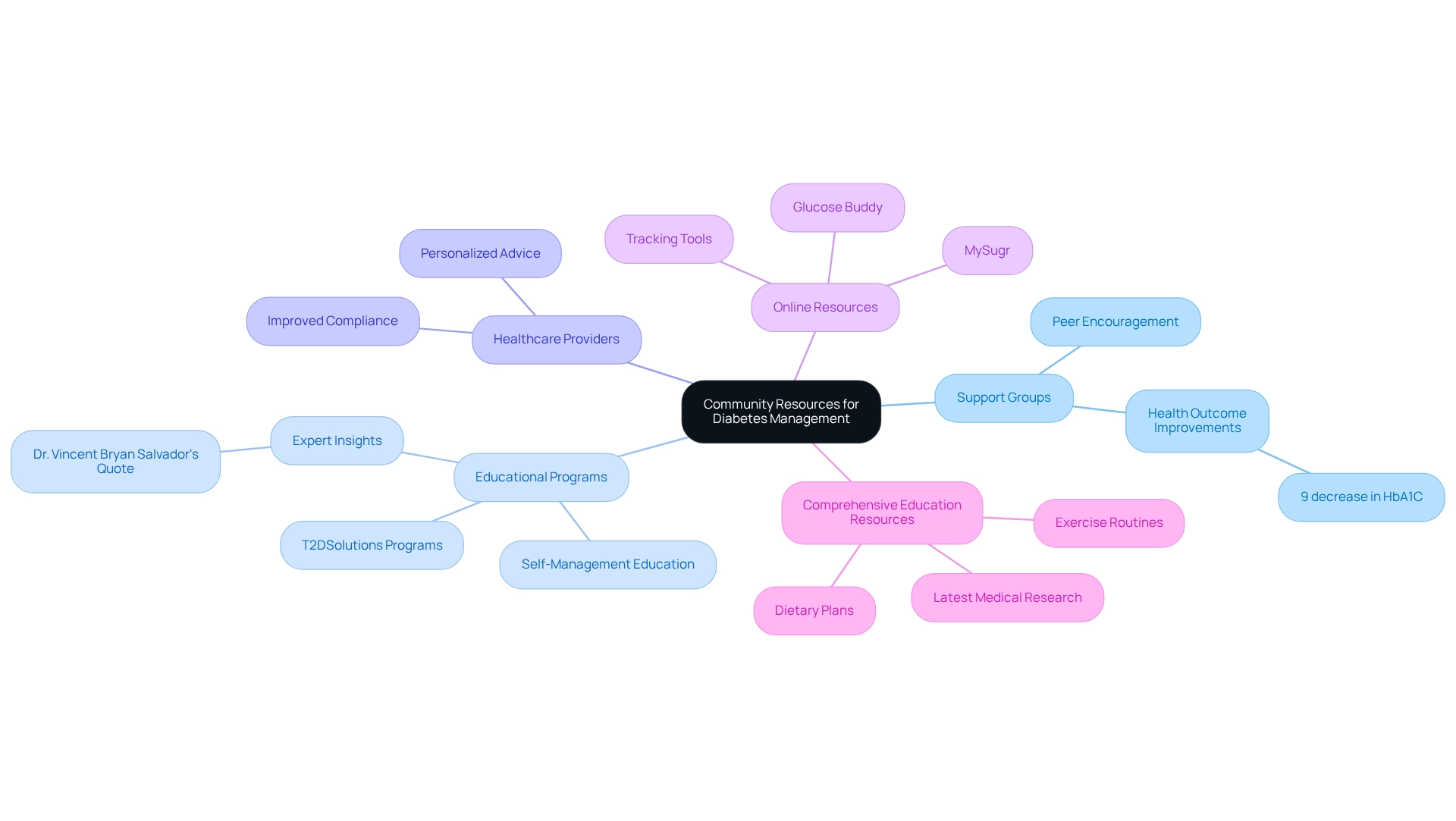Overview
Managing Type 2 diabetes and insulin can feel overwhelming, but you're not alone in this journey. It's essential to understand your condition and recognize its symptoms. By making lifestyle changes and engaging with community resources, you can take meaningful steps toward better health.
A comprehensive approach is crucial. This includes:
- Dietary modifications
- Regular physical activity
- Consistent blood sugar monitoring
It's also important to build a support network. Remember, these changes are not just about managing a condition; they are about improving your overall well-being.
We encourage you to seek out resources and support. You're not alone in this journey, and there are people and tools available to help you every step of the way. Together, we can navigate this path toward a healthier future.
Introduction
Type 2 Diabetes has emerged as a significant health challenge, affecting millions worldwide. This condition, characterized by insulin resistance and elevated blood sugar levels, can feel overwhelming. It’s important to have a comprehensive understanding of its key concepts, symptoms, and management strategies. Recognizing the early signs can lead to timely intervention, and implementing lifestyle changes can make a real difference. Leveraging community resources is also vital in navigating the complexities of diabetes.
As awareness grows, so does the importance of education and support. You are not alone in this journey. Empowering individuals to take charge of their health is essential. This article delves into the critical aspects of Type 2 Diabetes, offering insights and guidance for those seeking to improve their health. Together, we can explore the path toward better management and a healthier future.
Understand Type 2 Diabetes: Key Concepts and Definitions
Diabetes type 2 and insulin resistance is a chronic condition characterized by the body's struggle to use insulin effectively, which leads to elevated blood sugar levels. Understanding key concepts is vital for managing this condition effectively:
-
Insulin Resistance: This happens when the body's cells become less responsive to insulin, making it harder to lower blood sugar levels. It's important to note that insulin resistance is common among many individuals, significantly contributing to the rising rates of diabetes type 2 and insulin. Alarmingly, more American men (41%) than women (39%) are affected by prediabetes, underscoring the urgency to address this issue.
-
Hyperglycemia: This term refers to high blood sugar levels, which can result in serious health complications if not managed properly. Recent research emphasizes the importance of monitoring and controlling blood sugar levels to prevent risks associated with diabetes type 2 and insulin.
-
Risk Factors: Key risk factors for developing diabetes type 2 and insulin resistance include obesity, a sedentary lifestyle, and genetic predisposition. Recognizing these factors is essential for implementing effective prevention and control strategies.
As Peter M. House wisely stated, "Diabetes is not a burden, but a lesson in perseverance and self-care." By understanding these concepts, individuals can better navigate their circumstances and appreciate the significant role of lifestyle changes in managing their condition successfully.
At T2DSolutions, we are here to support you on this journey. We offer valuable resources and community support to aid in your education and care. Collaborating with experts enriches our knowledge base, empowering you with trustworthy information for your health journey. Remember, you're not alone in this journey; we are here to support you every step of the way.

Identify Symptoms of Type 2 Diabetes: Recognizing Early Signs
Common symptoms of diabetes type 2 and insulin include:
- Increased thirst due to elevated blood sugar levels
- Frequent urination especially at night
- Extreme hunger even after meals as the body struggles to utilize glucose
- Fatigue from the body’s inability to convert food into energy efficiently
- Blurred vision from fluctuating blood sugar levels
- Slow healing sores which may signal potential complications related to diabetes type 2 and insulin
Recognizing these symptoms early is vital. Timely medical advice and intervention can significantly improve outcomes. It's understandable to feel concerned if you notice any of these signs. Statistics suggest that people with impaired glucose tolerance (IGT) or impaired fasting glucose (IFG) face an increased risk of advancing to diabetes type 2 and insulin-related complications. Research indicates that up to 70% of those with IGT may develop diabetes type 2 and insulin resistance within 10 years. This highlights the importance of awareness and early detection.
For instance, a case study from a specific organization emphasizes a patient who identified heightened thirst and frequent urination as early indicators. This led to a swift diagnosis and effective handling strategies. By promoting community involvement and sharing experiences, the organization aims to empower individuals to recognize these signs and seek the necessary support. You're not alone in this journey.
Additionally, T2DSolutions provides educational materials and support for those recently diagnosed. They assist individuals in navigating their journey and accessing the latest advancements in health oversight, such as the ARPA-H award for research on implantable devices for metabolic disorders and obesity. This demonstrates the continual innovation in this sector, improving the potential for better outcomes. We are here to support you every step of the way.

Implement Management Strategies: Lifestyle Changes and Treatment Options
Effectively managing diabetes type 2 and insulin requires a compassionate and multifaceted approach that combines lifestyle changes with medical treatment. Here are some key strategies to consider:
-
Dietary Modifications: It's important to focus on a balanced diet rich in whole grains, fruits, vegetables, and lean proteins, while minimizing processed foods, added sugars, and saturated fats. Recent studies suggest that prioritizing the quality of food over quantity can significantly impact diabetes management. For example, aiming for an intake of around 20.3 grams of nuts and seeds daily can support overall health. Our organization is here to provide resources and guidance on meal planning and nutritional education, helping you make informed dietary choices.
-
Regular Physical Activity: Engaging in at least 150 minutes of moderate exercise each week—like walking, swimming, or cycling—can be beneficial. Current guidelines recommend incorporating both aerobic and resistance training to improve insulin sensitivity and blood sugar control, particularly for those managing diabetes type 2 and insulin. We offer access to fitness programs and community support to encourage you to stay active.
-
Blood Sugar Monitoring: Regularly monitoring your blood sugar levels is crucial for understanding how your dietary choices, physical activity, and medications influence your glucose levels. This practice empowers you to make informed adjustments to your management strategies. Our organization is here to help you interpret your monitoring results and adjust your approach as needed, focusing on medication management, which includes collaborating with healthcare providers to evaluate the need for medications, particularly in the context of diabetes type 2 and insulin, to effectively regulate blood sugar levels. A notable case study from 2020 revealed that there were 267,000 emergency department visits for hyperglycemic crises among adults with sugar metabolism disorders, highlighting the importance of proactive oversight and education to prevent acute complications. We provide educational resources to help you understand your medication options and the importance of adherence.
Furthermore, it's important to recognize that non-Hispanic Black children and adolescents faced the highest rates of Type 2 Diabetes from 2002 to 2018. This underscores the need for effective management strategies tailored to diverse populations. T2DSolutions is dedicated to offering customized resources that address the unique needs of various communities.
Implementing these strategies can lead to improved blood sugar regulation and overall well-being, enabling you to manage your condition effectively with the support of T2DSolutions. Remember, you're not alone in this journey; we are here to support you every step of the way.

Engage with Community Resources: Support Networks and Educational Tools
Connecting with community resources is essential for effectively managing diabetes type 2 and insulin. It’s understandable to feel overwhelmed, but there are key avenues to explore that can make a significant difference:
-
Support Groups: Engaging with local or online diabetes support groups allows individuals to share experiences and receive encouragement from peers facing similar challenges. Research shows that involvement in these groups can lead to substantial enhancements in health outcomes. One study demonstrated a 9% decrease in HbA1C levels among participants who took part in education related to blood sugar management, compared to a 5% decrease in those who did not. This highlights the essential role of education on diabetes type 2 and insulin-related illnesses in achieving improved health outcomes.
-
Educational Programs: Enrolling in self-management education programs for this condition is crucial for gaining knowledge about effective management strategies. T2DSolutions offers customized educational programs aimed at empowering people, equipping them with the skills required to manage their condition effectively. Experts emphasize that such educational initiatives are vital components of a comprehensive treatment plan for managing diabetes type 2 and insulin. Dr. Vincent Bryan Salvador, M.D., emphasizes, "Our findings highlight the significance of education regarding diabetes type 2 and insulin as a component of the treatment strategy for individuals affected by it."
-
Healthcare Providers: Regular consultations with healthcare professionals, including dietitians and educators for blood sugar management, offer personalized advice tailored to your needs. These interactions can improve understanding and compliance with care plans, ultimately resulting in better health outcomes. Remember, you’re not alone in this journey; support is available.
-
Online Resources: Utilizing specialized websites and applications, like MySugr and Glucose Buddy, for blood sugar control can offer useful advice, recipes, and tracking tools. These resources are designed to support you in your daily management efforts, making it easier to stay informed and engaged.
-
Comprehensive Education Resources for Diabetes Management: This organization offers a broad selection of educational materials, including dietary plans, exercise routines, and insights into the latest medical research breakthroughs. These resources enable you to make informed choices regarding your health and effectively manage your condition.
Engaging actively with these resources, including those offered by T2DSolutions, can help cultivate a supportive community and provide you with the necessary tools for successful diabetes management. Remember, we are here to support you every step of the way.

Conclusion
Understanding Type 2 Diabetes is essential for effectively managing the condition and preventing complications. This article highlights key concepts such as insulin resistance and hyperglycemia, which are vital for you to grasp as you navigate your health journey. It's understandable to feel overwhelmed, but recognizing early symptoms like increased thirst and fatigue can lead to timely interventions, significantly improving your outcomes.
Making lifestyle changes, such as modifying your diet and incorporating regular physical activity, along with consistent blood sugar monitoring and medication management, forms the foundation of diabetes management. Engaging with community resources is incredibly important; support groups and educational programs offer valuable opportunities for you to share experiences and gain knowledge, fostering a sense of belonging and empowerment.
Ultimately, managing Type 2 Diabetes is a multifaceted endeavor that requires education, support, and commitment. By understanding the condition and leveraging available resources, you can take proactive steps toward a healthier future. With the right tools and community support, it is possible not only to manage diabetes effectively but also to lead a fulfilling life. The journey may be challenging, but remember, you're not alone in this journey. Together, we can work towards significant rewards in health and well-being.
Frequently Asked Questions
What is diabetes type 2 and insulin resistance?
Diabetes type 2 and insulin resistance is a chronic condition where the body struggles to use insulin effectively, leading to elevated blood sugar levels.
What is insulin resistance?
Insulin resistance occurs when the body's cells become less responsive to insulin, making it more difficult to lower blood sugar levels. It is a common condition that significantly contributes to the rising rates of diabetes type 2.
How prevalent is insulin resistance among different genders?
Insulin resistance affects more American men (41%) than women (39%), highlighting the urgency to address this health issue.
What does hyperglycemia mean?
Hyperglycemia refers to high blood sugar levels, which can lead to serious health complications if not managed properly.
Why is monitoring blood sugar levels important?
Monitoring and controlling blood sugar levels is crucial to prevent risks associated with diabetes type 2 and insulin.
What are the key risk factors for developing diabetes type 2 and insulin resistance?
Key risk factors include obesity, a sedentary lifestyle, and genetic predisposition. Recognizing these factors is essential for effective prevention and control strategies.
What is the significance of lifestyle changes in managing diabetes?
Lifestyle changes play a significant role in managing diabetes effectively, as they can help individuals navigate their circumstances and improve their health.
How can T2DSolutions assist individuals with diabetes?
T2DSolutions offers valuable resources and community support to aid in education and care for individuals with diabetes, emphasizing that they are not alone in their journey.



